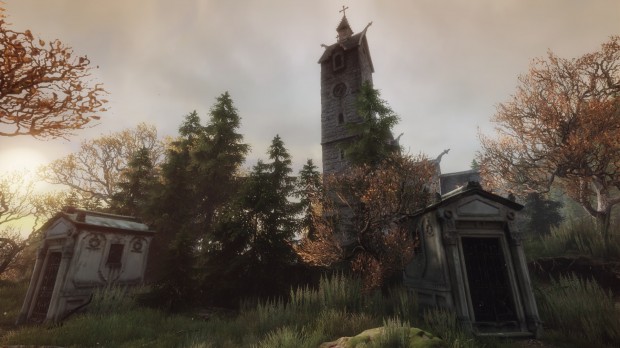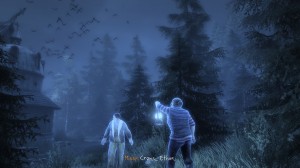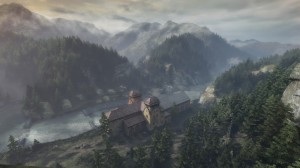The Vanishing of Ethan Carter Review (PC)
- Updated: 10th Nov, 2014

I’ve never been to rural Wisconsin. But now I feel like I have, thanks to The Vanishing of Ethan Carter.
I’ve walked through gently shaded autumnal woods, watching rags of mist gathering on distant peaks. Wandered across a dam, marvelling at the sun reflected on the lake beneath and pools of recent rainwater on the pavement. Climbed a hill amongst ancient, mossy boulders with grass waving around me, just to see the view at the top.
The Vanishing is a beautiful game. Even on my limited hardware it evoked landscapes of such painful realism that I wanted to reach through the screen and touch it. It uses that reality to make you ask questions. Where, exactly, is this place? Why is it such a state of disrepair? And, most of all, where the hell is everybody?
And it’s a good job that the title is so full of achingly lovely vistas. You’re going to be spending a lot of time wandering about, looking at them while wondering what on earth you’re supposed to do next.
From the opening message, which proclaims the game a “narrative experience that does not hold your hand”, it’s obvious that Ethan Carter belongs the genre commonly derided as “walking simulators”. But its ambitions are much bolder. Unsatisfied with the weak game elements that characterised story driven masterpieces like Dear Esther and Gone Home, it seeks to challenge you. To make you think not just about the story and characters, but about puzzles too.
You play a detective, seeking to solve the titular mystery. But not any old detective. Not when you’re saddled with a name like Paul Prospero. This detective is psychic, and can use his powers to piece together the past once he’s gathered enough clues from a crime scene.
 You uncover secrets by stumbling on top of them, whereupon they’re labelled and can be clicked on. Sometimes the interaction picks the item up, sometimes it’s just to examine the object. To say much more would be giving spoilers. Because when the game says it doesn’t hold your hand, it means it. There’s no tutorial, no hints, nothing except you, your mouse and a keen sense of experimentation.
You uncover secrets by stumbling on top of them, whereupon they’re labelled and can be clicked on. Sometimes the interaction picks the item up, sometimes it’s just to examine the object. To say much more would be giving spoilers. Because when the game says it doesn’t hold your hand, it means it. There’s no tutorial, no hints, nothing except you, your mouse and a keen sense of experimentation.
That, right there, is the big problem with Ethan Carter. In its determination to be hands-off and let the story be the guide, it can leave you lost, forlorn and frustrated. Without clues you often have blunder about, struggling to find an important click point that you missed. In one instance I ended up traversing the entire length of the game world because I’d failed to properly explore a patch of forest a little off the beaten track. There were no hints I needed to look there, just the game stubbornly refusing to let me progress until I had.
Once you’ve got to grips with the way the game wants to be played, things become more interesting. The puzzles are not especially difficult, but they’re more of a challenge than Gone Home’s simple “find key, open lock” formula. And while there’s a central method to Paul’s psychic sleuthing, the game does try to mix things up a bit beyond just making you look for hidden objects. There’s even one section where you have to be on your guard against a stealthy, scary enemy.
 At the start, the plot suffers from the same lack of focus as the puzzles. Again, lacking preamble, there are no initial plot hooks to pull you forward. But as you start to piece together the events leading up to Carter’s disappearance, the tone of the game becomes much darker. With pieces of the mystery slotting into place, it’s clear that the whole puzzle is going to be showing some very grim vistas indeed. The sense of gathering momentum is palpable, and propelled me on over the final hurdles of frustration the game placed in my path.
At the start, the plot suffers from the same lack of focus as the puzzles. Again, lacking preamble, there are no initial plot hooks to pull you forward. But as you start to piece together the events leading up to Carter’s disappearance, the tone of the game becomes much darker. With pieces of the mystery slotting into place, it’s clear that the whole puzzle is going to be showing some very grim vistas indeed. The sense of gathering momentum is palpable, and propelled me on over the final hurdles of frustration the game placed in my path.
When you’re done, it’s a game that lingers. The sense of place is conjures is so solid that recalling some of its scenes begins to feel like memories from an eerie walk in isolated countryside. It’s worth wandering around again, because there are little flourishes of meaning in the landscape you’ll only spot once you know the whole story. And, like all well-worked narratives there are layers of meaning and symbolism that are best appreciated from a distance.
The Vanishing of Ethan Carter is a bold, but not entirely successful, experiment in narrative-driven gaming. Its desire to marry visual and narrative aesthetics with more traditional puzzling is noble. But in pursuit of the laudable goal of trying to keep the player immersed in the atmosphere, it sometimes leaves them floundering instead. That balance something worth striving towards, a fusion which some game, someday will perfect. Ethan Carter is not that game. One day, however, I’m sure we’ll look back on it as an essential stone on the path to story-game nirvana.


Follow Us!